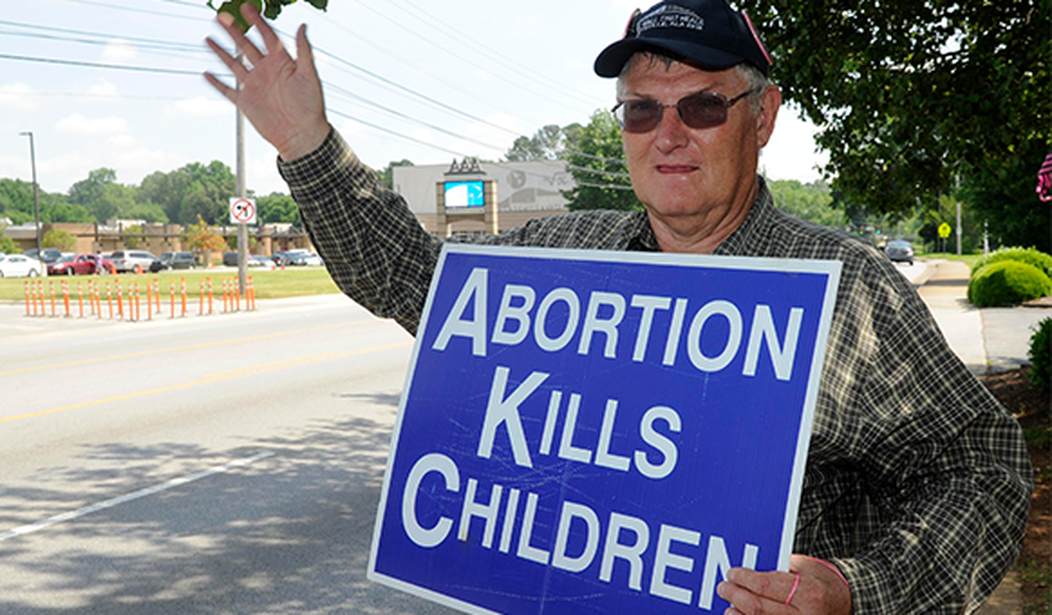Many of those who are passionately pro-life use the term “murder” as their descriptor of abortion. It isn’t. At least not yet.
“Murder” is generally defined in America as the intentional killing of one human being by another. And “first degree murder” is defined as the intentional killing of one human being by another with premeditation—that is, with an intent to kill the victim. Abortions clearly meet these objective criteria for first degree murder, except that abortion is a legally protected circumstance of premeditated killing.
The “pro-choice” zealots will immediately become unhinged when one uses “murder” as a synonym for abortion, and would be justified in such a counterattack because legal abortion is not murder. But the idea of focusing on the killing of one human being by another should not be abandoned simply because abortion does not currently constitute murder.
Using the term “homicide”—the generic label for all killings of one human being by another, regardless of its illegality—would be an exactly correct descriptor for abortion. “Homicide” retains the fundamental idea that abortion kills other human beings, but avoids the legalistic entanglements associated with “murder.” As well, abortions can also quite rightly be termed “filicide” because they involve the purposeful killing of a son or daughter by his or her parent.
Of course, the strongly pro-abort person will immediately decry that an unborn child is not a human being; rather “it” is merely a “clump of cells” or a “fetus.” Wrong. The federal “Protection of Unborn Children Act” (18 U.S. Code Section 1841) punishes any infliction of death or injury on an unborn child as a separate offense identical to that committed against his or her pregnant mother, whatever, among a myriad of federal offenses, that crime may be. And the separate punishment occurs regardless of whether the offender knew or should have known the victim-mother was pregnant.
Recommended
According to the Act, the term “unborn child” (or “in utero child”) explicitly refers to “a member of the species homo sapiens” “who is carried in the womb” “at any stage of development.” Thus, according to federal law, unborn children, regardless of their level of gestation, are human beings. As well, the Act thereby also defines when the life of a human being begins—at conception.
The Protection of Unborn Children Act specifically excludes the prosecution of a mother who consents to abort her child and any other person whose action is related to that consented abortion. But this exclusion is irrelevant to the question of whether an unborn child is a human being. The exclusion means that only those mothers who consent to, and doctors who perform, that abortion commit a non-criminal homicide—the legal killing of one human being by another.
Using the term “homicide” as a descriptor of abortion, then, is irrefutable based on existing federal law. And “homicide” is also an extremely powerful word-concept because it unequivocally asserts that the true nature of abortion involves the killing of a human being. It makes exactly the same point as the incorrect term “murder,” and it is not subject to critical examination of the subtleties of statutory criminal law.
As we know based on the leak of the imminent U.S. Supreme Court decision in Dobbs v. Jackson Women’s Health Organization, the Court will probably modify, perhaps to a great extent, its 1973 decision in Roe v. Wade. The modification is rumored to overturn Roe’s inferred constitutional liberty of reproductive autonomy through the second trimester of pregnancy, instead displacing questions of reproductive autonomy to individual states based the 10th Amendment (if powers are not explicit in the Constitution, those questions revert to the states and to the People).
Assuming that Roe will be modified along these lines, what, then, are the implications that abortion is indistinguishable from homicide? The most vociferous objection to Dobbs seems to be that many states will severely restrict access to abortion—whether based on the very early age of the unborn child (e.g., the “Heartbeat Law” that disallows homicides against the unborn after about six weeks), the rationales for the homicide (e.g., the child’s pre-identified sex or physical anomaly), forcing facilities that perform homicides against unborn children to have much stricter standards (thereby closing many current abortion facilities), disallowing certain exceptions that currently permit these homicides to be performed (e.g., rape or incest), or even making all homicides against unborn children illegal.
All of these anticipated restrictions that may occur after Dobbs relate in some way to the Supreme Court’s previous idea of an “undue burden” to access a physician who commits homicide against the unborn (Planned Parenthood v. Casey, 1992)—specifically forcing a pregnant woman to undergo considerable travel and expenses to find that physician. My response to the idea of “undue burden” is: “Shouldn’t states have a compelling interest to limit homicide within their borders?” And: “Is the requirement to travel a few hundred miles to commit a legal homicide really all that burdensome?”
Roe determined (and Casey affirmed) that states have an interest in protecting a viable unborn child (one who could live outside the womb with medical care). Assuming Dobbs will revert decisions about reproductive autonomy back to the People, laws allowing abortion after viability begins may be struck down as unconstitutional. Unborn children are human beings and therefore subject to the 5th and 14th Amendments’ prohibitions against the deprivation of “life, liberty, or property without due process of law.” Add to those the 14th Amendment’s prohibition against a state’s denial of “equal protection of [its] laws.” After all, born people are protected against being victims of homicide.
Gary S. Green, Ph.D. is an academic criminologist and retired Professor of Government at Christopher Newport University in Newport News, VA.
























Join the conversation as a VIP Member